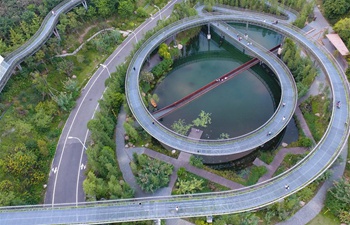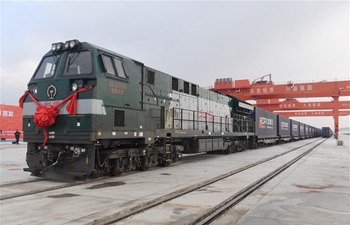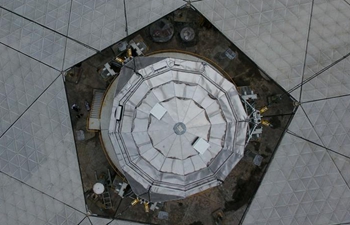
U.S. President Donald Trump speaks on newIranstrategy at theWhite Housein Washington D.C., theUnited States, on Oct. 13, 2017. U.S. President Donald Trump rolled out his new Iran strategy on Friday, vowing to deny Tehran "all paths to a nuclear weapon" in a major shift in Washington's Iran policy. (Xinhua/Ting Shen)
By Matthew Rusling
WASHINGTON, Oct. 13 (Xinhua) -- Despite U.S. President Donald Trump's railing against the Iran nuclear deal on Friday, it may remain in place in the long run, U.S. experts said.
Trump failed to certify that Iran was playing by the rules stipulated in the nuclear deal, and contended that the Islamic republic is in defiance of the agreement. That places the ball in Congress' court, as the lawmakers now have the option to vote to snap sanctions back into place.
The move seems to be a step toward scrapping the agreement, but does not kill the deal, and experts said there's a chance the international accord may remain intact.
"Trump is not certifying the Iran agreement, but isn't taking the types of steps that would completely unravel it," Brookings Institution Senior Fellow Darrell West told Xinhua.
"He has put the ball in Congress' court to re-impose sanctions, but with a 60 vote threshold in the U.S. Senate, that is not likely to happen," he said.
"So without a re-imposition of sanctions, the deal very well could remain in force even without the certification," West said.
West said Trump's step "is less draconian than people feared. Trump has stepped up to the line but not really killed the agreement."
"It doesn't seem likely that any of the other signatories to the agreement are going to pull out. So much of it is likely to stay in effect for Iran," West said.
The deal, clinched in July 2015 between Iran and the six countries of Britain, China, France, Russia and the United States plus Germany after a decade of painstaking negotiations, has seen Iran scale down nuclear projects in exchange for international sanctions easing.
Trump and other critics have long blasted the deal as a path to nuclear weapons for Iran, though the latter insists its nuclear program is peaceful.
In a televised speech on Friday, Trump accused Iran of committing "multiple violations" of the deal, although the International Atomic Energy Agency maintains that Iran is complying with the agreement.
Speaking on television on the same day, Iranian President Hassan Rouhani said Trump's claims that Tehran is not abiding by the rules laid out in the agreement are completely baseless.
Dan Mahaffee, senior vice president and director of policy at the Center for the Study of Congress and the Presidency, told Xinhua that Trump's decision reflects both traditional conservative foreign policy concerns about Iran's role in the Middle East, as well as Trump's desire to undo many of the legacy accomplishments of former President Barack Obama.
Trump signed an executive order to gut the Affordable Care Act, commonly known as Obamacare on Thursday, and announced in June that the United States will leave the Paris agreement on climate change. Both were achieved during the Obama administration.
The Iran nuclear deal was made possible by the fact that the United States, Russia, China, and the Europeans were unified in their approach to to curbing the Iranian nuclear program.
According to a resolution adopted unanimously by the 15-member UN Security Council on July 20, 2015, the council will terminate its sanctions on Iran upon receiving a report from the International Atomic Energy Agency (IAEA) that verifies Iran's implementation of its nuclear-related commitments.
The IAEA, a UN watchdog tasked with monitoring Iran's nuclear activities, had in the past certified eight times Iran's compliance with the nuclear deal.
Yukiya Amano, IAEA director general, confirmed on Friday that Iran had been implementing the nuclear deal under the robust nuclear verification regime.
On the same day, leaders of France, Germany and Britain reiterated in a joint statement that they remain committed to the nuclear accord, calling for "its full implementation by all parties."
The deal's supporters admit the deal is not perfect, but they say this may be the last chance that such a large international consensus can be built on the issue.
"I don't see how the same international coalition will be assembled to confront Iran in the future," Mahaffee said.
Related:
Spotlight: Trump's Iran decertification announcement again rattles world
WASHINGTON, Oct. 13 (Xinhua) -- U.S. President Donald Trump's Friday decertification of Iran's compliance with the landmark nuclear deal has provoked wide disturbances and fury in and outside the United States. Full story
Spotlight: Trump's decertification claim harms Iran nuclear deal
WASHINGTON, Oct. 13 (Xinhua) -- In his latest attempt to fulfill another campaign promise, U.S. President Donald Trump on Friday dealt a blow to the Iran nuclear deal without scrapping it.
"I am announcing today that we cannot and will not make this certification (of Iran's compliance with the nuclear deal)," Trump said at the White House as he unveiled a new Iran strategy of his administration. Full story
Trump seeks to deny Iran "all paths to a nuclear weapon" in major policy shift
WASHINGTON, Oct. 13 (Xinhua) -- U.S. President Donald Trump rolled out his new Iran strategy on Friday, vowing to deny Tehran "all paths to a nuclear weapon" in a major shift in Washington's Iran policy.
The strategy was "the culmination of nine months of deliberation with Congress and our allies," according to the White House. Full story















